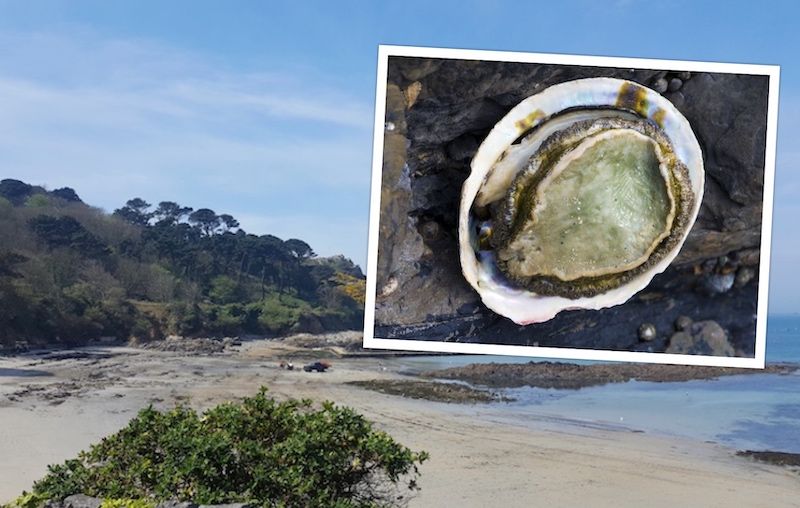


Concerns have been raised in the States about the commercialisation of ormers and the potential threat it poses to the sustainability of the species.
The debate around ormers arose following questions from Deputy Yvonne Burford, who asked Environment & Infrastructure President Lindsay de Sausmarez whether her committee has up-to-date data about the sustainability of our ormer population.
In light of recent controversy over their commercialisation, Deputy Burford wanted to know whether E&I would be investigating its effect on the much-loved Guernsey ormer.
"We have no current empirical evidence on the sustainability of the current ormer population," Deputy de Sausmarez confirmed.
Pictured: Deputy de Sausmarez responded to questions about the sustainability of Guernsey's ormer population.
"All existing evidence is either anecdotal or historic and neither can provide a clear view of current population numbers, but they do raise some concerns around sustainability."
That threat to sustainability relates not only to large takes of ormers, but to the disruption caused to their habitats as well.
"Turned rocks that are not adequately replaced can have an effect called bleaching," said Deputy de Sausmarez. "We are currently looking at the extent of this problem on our rocky shores."
She said her committee does not have any resources set aside to investigate this lack of data, noting that government funds are in short supply.
"However that is not to say the work cannot be done. We are lucky to have an incredible third sector supporting our environment and various initiatives already underway that can help contribute to this evidence base such as La Societe’s ormer tagging project and the Go Seas project.
Is this sustainable?
— Adrian Gabriel (@gabriel4gsy) January 14, 2021
I appreciate that some may not be able to get out and harvest what they need, but it seems to be more commercial now. #sustainability pic.twitter.com/OGbTE8dKeR
Pictured: Concerns were raised on social media last month.
"What I think these questions are really driving at, by implication, are particularly around the sustainable harvesting rate, which of course engages the Committee for Economic Development's mandate, so if that is work they see fit to prioritise, I am sure we could look at the potential to resource it between us with the support of the community to help us."
Economic Development President Neil Inder said there have been email exchanges between the two committees on the subject of ormer gathering. In those emails, which are due to be followed up by a meeting, he said that concerns had been expressed about the retail sale, size of catch and night time gathering of ormers.
Meanwhile,Deputy Carl Meerveld wanted to know if E&I would support a ban on commercial sale.
"I certainly share concerns that commercial sale of catches is incentivizing larger takes from the beach than are needed for an individual’s consumption," he said.
Pictured: Deputy Meerveld wanted to know if E&I would support putting an end to the commercial sale of ormers.
Deputy de Sausmarez said that point of view "has come up in conversation" and does capture a wider public unease about the sale of ormers.
"That really does encroach into the mandate of the Committee for Economic Development. But I think what Deputy Meerveld is asking does raise something that has certainly come up in those conversations, which is ‘are we creating perverse incentives to commercialise what has always been a historic past-time, part of Guernsey culture?’
"Certainly a lot of the feedback that I have had on a personal level has been around that uneasiness of that commercialisation."
Deputy Andrew Taylor was feeling a little less sentimental about the gastropod's future.
"Personally I couldn’t care less if there were any ormers left, I think you could replace them with flip flops and no one would know," he said, before asking: "Do you think we could ever reach the stage where we could make an educated guess on the right direction and the way we move forward?"
"I would rather we make a well-informed guess about the way forward," Deputy de Sausmarez replied. "Especially when it is something as important as the Marine Spacial Plan, which is a gateway to a thriving blue economy. It has huge economic ramifications in fact and I really don’t think that is the arena for guesswork. I think hard and fast data is what you need to base your decisions on."
Deputy Taylor has since said to Express: "It was a tongue-in-cheek remark and was followed by reference to my Dad’s cooking.
"I do appreciate it probably (definitely!) wasn’t the best opening line and I apologise for that. Whilst I’d never want to see an ormer on my dinner plate, I would definitely not want to see them disappear from our shores and would strongly support swift action to protect them if it was deemed necessary."
Comments
Comments on this story express the views of the commentator only, not Bailiwick Publishing. We are unable to guarantee the accuracy of any of those comments.